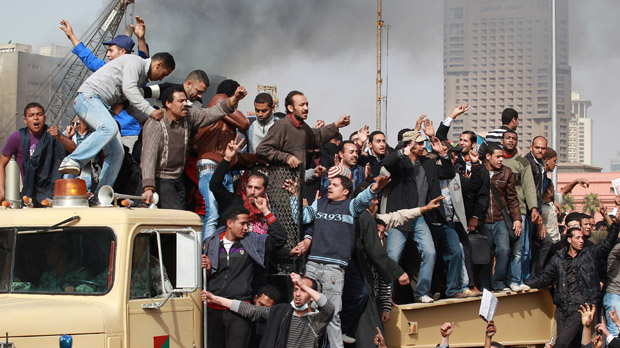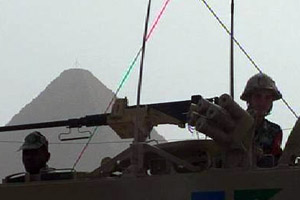Egypt: tense mood as regime tries to close down protests
Thousands defy a curfew to demand the resignation of President Mubarak, with one protester telling Channel 4 News “they can shoot me” because “Egypt is dead anyway”.
The mood is tense across Egypt as the army attempts to shut down anti-government protests after days of violence. On Saturday President Mubarak installed three military men into top government jobs.
Tens of thousands of demonstrators returned to the streets despite the army telling them not to congregate. As the army was deployed in greater force, the numbers killed during five days of trouble rose to more than a 100. Three more people died as officers opened fire on streams of protesters trying to storm the city’s interior ministry.
But officers allowed protesters into Freedom Square as they called for President Hosni Mubarak, who has been in power since 1981, to be removed.
Authorities extended curfew hours in Cairo, Suez and Alexandria – it kicked in at 4pm local time (2pm GMT).
We’re dead anyhow. If I go home I’m dead, if I stay I’m dead. Psychological death is worse than physical death. Cairo protester
One protester told Channel 4 News he did not care if he was shot dead for protesting.
He said: “Let them come and kill us. Who cares?
“We’re dead anyhow. If I go home I’m dead, if I stay I’m dead. Psychological death is worse than physical death.
“They’re down – they don’t know what to do.”

Cameron’s ‘grave concern’
David Cameron has phoned President Mubarak to express his “grave concern” about the escalating violence.
A Downing Street spokesman said the PM had urged Mubarak to “take bold steps to accelerate political reform and build democratic legitimacy” rather than attempt to repress dissent.
In a joint statement with French President Nicolas Sarkozy and German Chancellor Angela Merkel, Mr Cameron added: “The Egyptian people have legitimate grievances and a longing for a just and better future.
“We urge President Mubarak to embark on a process of transformation which should be reflected in a broad-based government and in free and fair elections.”
Egypt uprising: #c4news live blog
Military appointments
Mr Mubarak earlier appointed a vice-president for the first time, putting intelligence chief Omar Suleiman into the post. He also created a second VP role and made former air force commander and aviation minister, Ahmed Shafiq, his new prime minister.
Egypt’s outgoing cabinet met beforehand to formally submit its resignation, after Mubarak told the government to quit because of the countrywide protests.
We saw burnt-out cars and looting with guns and weapons. British tourist
Foreign Secretary William Hague has called on the Egyptian government to “behave with restraint”.
He said: “It’s very important now that he [Mubarak] listens to the aspirations of the Egyptian people and that he’s able to set out real and visible reforms.”
ElBaradei calls for handover
Egyptian activist Mohamed ElBaradei has again called for President Mubarak to step down.
The former chief of the UN nuclear watchdog said Mubarak “did not understand the message of the Egyptian people”.
He is urging Mubarak to set a framework for the transition of power – adding that this would be the only way to end the unrest that has rocked Egypt.

Pyramids closed, flights turned back
Egypt’s most famous tourist attraction – the pyramids – were closed earlier by the army as unrest spread from central Cairo. Flights to Cairo were turned back in the air as the Foreign Office urged “only essential travel” to Cairo, Alexandria, Luxor and Suez.
British tourists arriving back in the UK described what they’d seen. One woman returning via Heathrow airport said: “We saw burnt-out cars and looting with guns and weapons.”
A fellow passenger said: “Even part of the Cairo museum was on fire.”